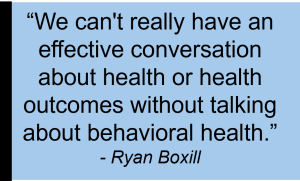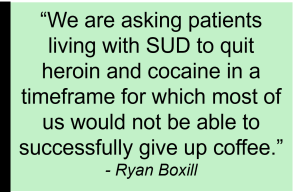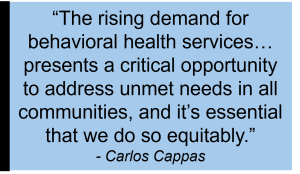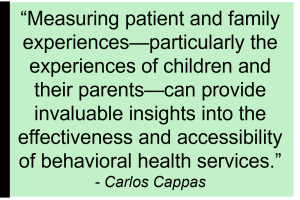Expanding MHQP’s Impact: Insights and Opportunities in Behavioral Health
(January 2025)
MHQP’s Board of Directors has recommended an expansion in MHQP’s work scope to include primary care-adjacent clinical areas, particularly behavioral health. The Board sees a critical need for MHQP’s measurement expertise and sense-making capabilities in this space, given behavioral health’s significant impact on physical health and overall healthcare costs. This need has become even more urgent given the spike in demand for behavioral health services in the wake of the pandemic.
To explore this priority further, we interviewed two members of MHQP’s governance bodies who are leaders in behavioral health. Their insights provide a deeper understanding of the state of behavioral health and healthcare in Massachusetts and offer guidance on how to advance care across the Commonwealth.

Ryan Boxill, PhD, MBA, a member of MHQP’s Board of Directors, is the Executive Vice President and Chief Operating Officer of NeighborHealth. Prior to his current role, he served as Chief Behavioral Health Officer for the Boston Medical Center (BMC) Health System. Dr. Boxill is a Licensed Clinical Psychologist in New York and Massachusetts, and he holds a PhD in Cross Cultural Clinical Psychology from the California School of Professional Psychology. He also holds an MBA from UMass Boston.

Carlos Cappas, PsyD, MBA, a member of MHQP’s Clinician Council, is the Chief Behavioral Health Officer at Lynn Community Health Center. In his role, Dr. Cappas leads a team of over 70 behavioral health professionals, providing a comprehensive range of integrated behavioral health services in primary care and in School-Based Health Centers. Carlos received his doctoral degree from Ponce Health Sciences University in Ponce, Puerto Rico and is a graduate of UMass Medical School’s Fellowship in Clinical Health Psychology in Primary Care. He also holds an MBA from UMass Boston.
What do you believe is the impact of behavioral health on the rest of health care?
Boxill:
 “There’s an enormous connection between behavioral health and physical health and the total cost of care. In my previous experience I’ve found that roughly 50% of a Medicaid population had a behavioral health diagnosis and those patients drove over 80% of the total cost of care. Data suggest that approximately 8 out of 10 MassHealth members who visited the ED for any reason had a behavioral health diagnosis. In addition, virtually all patients (97%) of those who were readmitted to the hospital within 30 days of being discharged had a behavioral health diagnosis. So, we can’t really have an effective conversation about health or health outcomes without talking about behavioral health.”
“There’s an enormous connection between behavioral health and physical health and the total cost of care. In my previous experience I’ve found that roughly 50% of a Medicaid population had a behavioral health diagnosis and those patients drove over 80% of the total cost of care. Data suggest that approximately 8 out of 10 MassHealth members who visited the ED for any reason had a behavioral health diagnosis. In addition, virtually all patients (97%) of those who were readmitted to the hospital within 30 days of being discharged had a behavioral health diagnosis. So, we can’t really have an effective conversation about health or health outcomes without talking about behavioral health.”
Cappas:
“When we compared data from our patients who were seen by primary care only versus patients who were seen by primary care and behavioral health through an integrated approach, we found that the patients who saw both primary care and behavioral health did better in two of our clinical quality performance scores: hypertension and diabetes. Our internal findings underscore the critical importance of breaking down silos and investing in integrated care models that truly prioritize patient-centered outcomes. When we care for the whole person, it gives us a chance to promote healthy behavior changes. I also think that integrating behavioral health into primary care not only enhances individual health outcomes but also enables us to track and analyze data more comprehensively.”
What do you see as the biggest challenges facing behavioral health care right now in Massachusetts?
Boxill:
“The historical underinvestment in behavioral health coupled with inadequate insurance reimbursements has led to a shortage of providers and a rising behavioral health need across the nation. Low reimbursement rates have hindered the ability of healthcare organizations, particularly those that are non-profit and community-based to effectively recruit and retain clinicians with the necessary skillsets to adequately treat the complexity of issues that patients with behavioral health needs are presenting with across various clinical settings.
 In addition, patients are not often afforded enough time in treatment to successfully treat their illness. There are also too many gaps in the care continuum for patients with behavioral health needs and too few options for patients who require more intensive prolonged episodes of care to manage their illness. For example, many patients grappling with substance use disorder are discharged from acute treatment settings within a matter of days, when probably months are needed to appropriately treat their substance use disorder. Often, we are asking patients living with SUD to quit heroin and cocaine in a timeframe for which most of us would not be able to successfully give up coffee. Unfortunately, our system tends to primarily focus on just the biological part of substance use and not enough focus is placed on the psychological aspects of substance use disorder as both are often required for patients to be successful in their recovery journey.”
In addition, patients are not often afforded enough time in treatment to successfully treat their illness. There are also too many gaps in the care continuum for patients with behavioral health needs and too few options for patients who require more intensive prolonged episodes of care to manage their illness. For example, many patients grappling with substance use disorder are discharged from acute treatment settings within a matter of days, when probably months are needed to appropriately treat their substance use disorder. Often, we are asking patients living with SUD to quit heroin and cocaine in a timeframe for which most of us would not be able to successfully give up coffee. Unfortunately, our system tends to primarily focus on just the biological part of substance use and not enough focus is placed on the psychological aspects of substance use disorder as both are often required for patients to be successful in their recovery journey.”
Cappas:
“Workforce. One of the biggest challenges we face is hiring enough behavioral health providers, specifically those who speak the languages of our community to meet the growing demand. We always strive to assign a provider who speaks the patient’s native language, but when that’s not possible, our clinicians rely on phone interpreters. While interpreters ensure communication, this approach adds complexity to a therapy session, often putting an extra burden on both the patient and the clinician. This added complexity has been shown to contribute to higher levels of stress and burnout, particularly for English-only speaking providers. Unfortunately, this exacerbates the existing workforce challenges. To address these issues, it’s essential that we continue to diversify our workforce. This will not only improve access to care for all patients but also help alleviate the burden on our current teams.”
How well do you believe the healthcare system is meeting the behavioral health needs of patients?
Boxill:
“We are not getting the value for what we spend on behavioral health in Massachusetts. We have data that shows a 20-year difference in life expectancy in ZIP codes that are only two miles apart. So yes, we can say Massachusetts has the best hospitals and the best care. But if I live in one of those ZIP codes, do I feel that way? Our healthcare system is great for certain people, but for a lot of people it has been a failure. I don’t think we have to spend more money; I think we need to spend the money in different ways. Additional investments on the behavioral health side are going to pay magnified dividends on the physical health side. For example, we know that psychotherapy done timely after discharge reduces the chances of readmissions.”
Cappas:
 “We can do more. The rising demand for behavioral health services has captured the attention of stakeholders who are in a position to drive system-wide change. This presents a critical opportunity to address unmet needs in all communities, and it’s essential that we do so equitably. One area that exemplifies the potential for impactful change is School-Based Health Centers (SBHCs). These health centers are uniquely positioned to meet the needs of children and adolescents in the very environment where they spend most of their time—at school. By providing a blend of behavioral health, primary care, and social support services, SBHCs address not only clinical needs but also the socio-environmental factors that influence well-being. However, these programs face a significant challenge: our behavioral health workforce is struggling to keep up with demand. To truly leverage the power of SBHCs, we must prioritize funding to expand these programs and build a robust, sustainable and diverse workforce pipeline. Additionally, it’s vital to focus on implementing and tracking appropriate measures and outcomes. This data will allow us to evaluate the impact of SBHCs longitudinally, demonstrating their value and effectiveness, and ensuring that resources are allocated efficiently.”
“We can do more. The rising demand for behavioral health services has captured the attention of stakeholders who are in a position to drive system-wide change. This presents a critical opportunity to address unmet needs in all communities, and it’s essential that we do so equitably. One area that exemplifies the potential for impactful change is School-Based Health Centers (SBHCs). These health centers are uniquely positioned to meet the needs of children and adolescents in the very environment where they spend most of their time—at school. By providing a blend of behavioral health, primary care, and social support services, SBHCs address not only clinical needs but also the socio-environmental factors that influence well-being. However, these programs face a significant challenge: our behavioral health workforce is struggling to keep up with demand. To truly leverage the power of SBHCs, we must prioritize funding to expand these programs and build a robust, sustainable and diverse workforce pipeline. Additionally, it’s vital to focus on implementing and tracking appropriate measures and outcomes. This data will allow us to evaluate the impact of SBHCs longitudinally, demonstrating their value and effectiveness, and ensuring that resources are allocated efficiently.”
What role can measurement play in advancing and improving behavioral health care in Massachusetts?
Boxill:
“We need better ways to understand patients’ experiences in navigating our complex systems. How long did you wait for a bed, for example, and what was that experience like for you and your loved ones? Or, what was your experience when your child was in the ED? We should also be following the experiences of people who are persistently or significantly ill and how well the system is supporting them. In general, I see a big role for measuring the effectiveness of behavioral health care on physical health outcomes. Because the good news is that we have very effective treatments for behavioral health concerns, and these obviously impact physical health as well.”
Cappas:
“I would like to see us get to a place where we are assessing the effectiveness of behavioral health services with the same rigor and focus that we apply to other areas of the health care system. This means not only tracking clinical outcomes but also evaluating broader indicators that reflect the holistic impact of care. For example, we should measure the long-term outcomes of behavioral health interventions, such as improved academic performance, reduced exposure to adverse childhood experiences (ACEs), and increased family stability.
 We also need to pay close attention to workforce trends, such as the number of clinicians entering training programs, retention rates, and the geographic distribution of providers. Understanding where providers are practicing can help identify and address service gaps in rural and underserved communities, ensuring that behavioral health services are accessible to everyone. The percentage of providers who are bilingual or multilingual is another critical metric, as it directly impacts access to care for diverse populations. Measuring patient and family experiences—particularly the experiences of children and their parents—can provide invaluable insights into the effectiveness and accessibility of behavioral health services.”
We also need to pay close attention to workforce trends, such as the number of clinicians entering training programs, retention rates, and the geographic distribution of providers. Understanding where providers are practicing can help identify and address service gaps in rural and underserved communities, ensuring that behavioral health services are accessible to everyone. The percentage of providers who are bilingual or multilingual is another critical metric, as it directly impacts access to care for diverse populations. Measuring patient and family experiences—particularly the experiences of children and their parents—can provide invaluable insights into the effectiveness and accessibility of behavioral health services.”
What’s next for MHQP
MHQP hopes to focus on areas of behavioral health delivery such as: patient and provider experiences, access challenges, health equity, and the return on investment of behavioral health initiatives. Our efforts may encompass a wide range of activities, from data collection and analysis to multi-stakeholder collaboration and policy advocacy. If you would like to learn more about MHQP’s exploration of these areas, please contact Natalya Martins at nmartins@MHQP.org.
